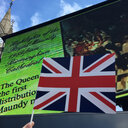Effect of Antiasthma Simplified Herbal Medicine Intervention on neutrophil predominant airway inflammation in a ragweed sensitized murine asthma model.
Parole chiave
Astratto
BACKGROUND
Neutrophil-predominant asthma is less responsive to steroids and associated with poorer disease control. The effects of Antiasthma Simplified Herbal Medicine Intervention (ASHMI), a traditional Chinese medicine formula reported to be efficacious in asthmatic patients and murine asthma models, on neutrophil predominant asthma are unknown.
OBJECTIVE
To determine the effects of standard ASHMI and refined formula ASHMI (ASHMI(II)) in a neutrophil-predominant murine model of ragweed (RW) asthma and explore underlying mechanisms.
METHODS
BALB/c mice were systemically sensitized, intranasally challenged with RW extract, and orally treated with ASHMI, ASHMI(II), or vehicle (water). In a separate experiment, some RW sensitized mice were treated with dexamethasone before challenge. After RW challenge, airway hyperreactivity (AHR), total and differential bronchoalveolar lavage fluid leukocyte counts, lung histologic features, and bronchoalveolar lavage fluid cytokine and chemokine levels were assessed. RW stimulation of the murine macrophage cell line RAW264.7 was used to determine effects of ASHMI active compound ganoderic acid C1 (GAC1) on tumor necrosis factor α (TNF-α) production and regulation of phosphorylated IκB and histone deacetylase 2 (HDAC2) levels.
RESULTS
ASHMI and ASHMI(II) markedly reduced AHR, mucous production, neutrophilic inflammation, and TNF-α, interleukin 8, and interleukin 17 levels and decreased eosinophilic inflammation and TH2 responses in vivo (P < .01-.001 for all). GAC1 inhibited TNF-α production in RW-stimulated RAW264.7 cells in association with suppression of phosphorylated IκB and increased HDAC2 expression. Dexamethasone failed to reduce AHR and neutrophilic inflammation.
CONCLUSIONS
ASHMI treatment was efficacious in a murine model of neutrophil-predominant asthma via modulation of innate chemokines, TH2 responses, nuclear factor-κB, and HDAC2. ASHMI, and/or its constituent GAC1, may be a valuable option for treating neutrophil-predominant asthma.


